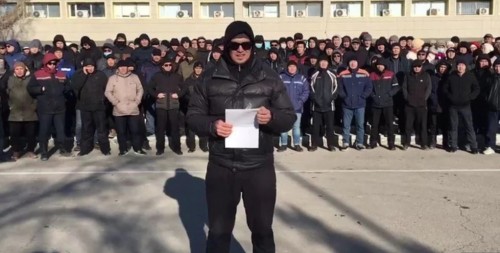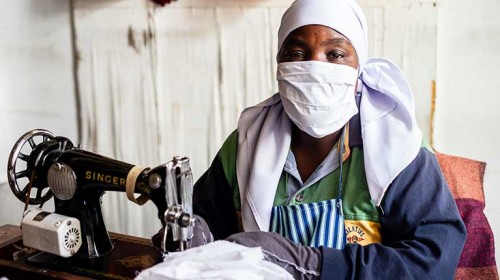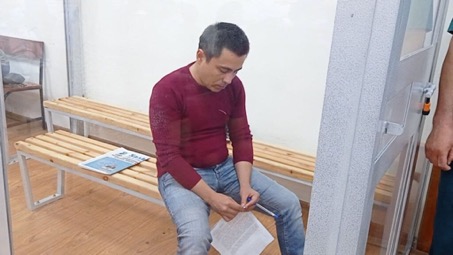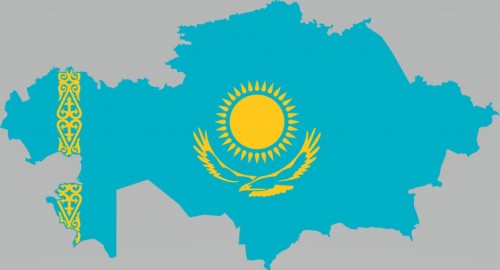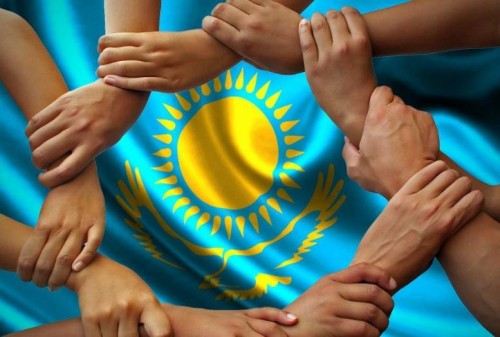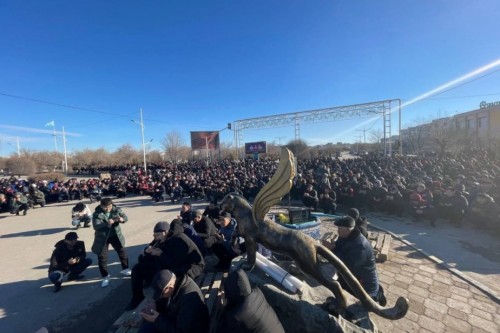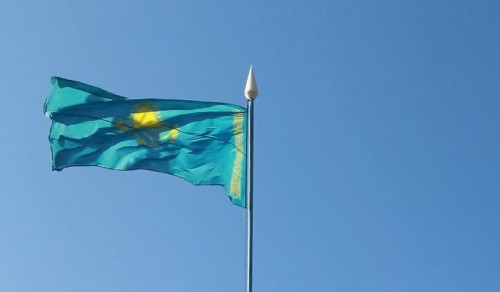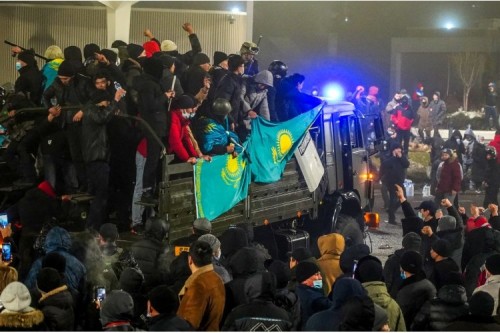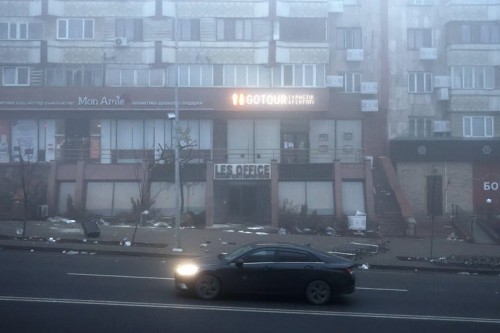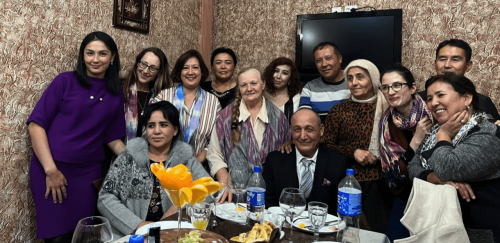Countries
Solidarity campaigns
13 August 2024
Georgia: Support striking workers at Evolution Gaming
5 June 2023
Georgia: Justice for Wolt couriers
10 May 2023
Belarus: Trade union activity is not extremism!
2 November 2019
Kazakhstan: Trade unionist Erlan Baltabay imprisoned - again!
19 November 2018
Kazakhstan: Stop repression and physical attacks on leaders of independent unions; hands off Larisa Kharkova, Erlan Baltabai and Dmitriy Senyavskiy
18 April 2018
MALOKHAT STILL NEEDS YOUR HELP
News
08 February, 2022 / kazakhstan
Hundreds Rally In Restive Kazakh Town Following Deadly Mass Protests
ZHANAOZEN, Kazakhstan -- Hundreds of residents of Kazakhstan’s restive town of Zhanaozen have rallied for several days to demand jobs after deadly anti-government protests that shook the country last month. The protesters gathered in front of the town’s administration on February 7, the sixth day of their rallies, saying that 2,500 men and women demand jobs in the local oil industry from the local and central government.
19 January, 2022 / International
ILO downgrades labour market recovery forecast for 2022
The ILO’s World Employment and Social Outlook Trends 2022 report warns of a slow and uncertain recovery, as the pandemic continues to have a significant impact on global labour markets.
18 January, 2022 / uzbekistan
UZBEK BLOGGERS AND ACTIVISTS UNDER ATTACK – THE CASES MOUNT
As events in Kazakhstan continue to spook neighboring Central Asian countries whose populations suffer almost identical social grievances, including grand corruption, increasing poverty, and soaring fuel prices, efforts of Uzbekistan’s authorities to stifle criticism of its government have been gathering pace long before the unrest in Kazakhstan erupted in early January of this year. Despite President Mirziyoyev’s much lauded reform program which has focused mainly on the economy, civil and political reforms have lagged well behind. Freedom of speech, freedom of association and the right of civil society groups to register formally as NGOs have failed to see any relaxation of draconian, Soviet-style rules of play. Indeed, the Uzbek government appears to have stepped up its control over the Internet and bloggers and journalists repeatedly receive “invitations” from the authorities to remind them of the boundaries of what they may report on.
16 January, 2022 / kazakhstan
A COMMUNIQUE BY THE CONFEDERATION OF LABOR OF RUSSIA (KTR) ON THE EVENTS IN KAZAKHSTAN
The Confederation of Labour of Russia (KTR) and its member organizations have watched the recent events in Kazakhstan with great pain and anxiety. The KTR has for many years been involved in the campaign to build an independent trade union movement in Kazakhstan and to promote and enforce labour and trade union laws that would benefit Kazakhstani workers. The KTR’s long engagement and cooperation with dozens of trade union organizations and thousands of activists in Kazakhstan have shown us that the processes underway there have a direct bearing on progress in labour relations not only in Russia, but also throughout Eastern Europe and Central Asia.
15 January, 2022 / kazakhstan
Statement on the establishment of the Human Rights Alliance for Fundamental Rights
The main goal of the Human Rights Alliance will be to facilitate honest and impartial identification of the timeline and course of protests; to analyze law enforcement actions as well as actions of various groups of protesters, reasons behind peaceful protest turning into violent riots; to ensure respect for fundamental rights during investigation and that all the standards of fair trial are in place; to prevent torture and ill-treatment, to guarantee accountability of perpetrators for committed crimes and offences, to guarantee fair and just prosecution of perpetrators and exoneration of innocent individuals; to clearly distinguish peaceful protesters, including political opposition members and civic activists, from those who committed acts of violence.
13 January, 2022 / kazakhstan
"LESSONS OF KAZAKHSTAN": THE FNPR ASSESSED THE EVENTS
The Federation of Independent Trade Unions of Russia analyzed the events that took place in Kazakhstan in the first days of 2022. The statement of the largest trade union center of Russia, posted on the official website of the organization, expresses sympathy for the Kazakh people. “The FNPR expresses sympathy for the fraternal Kazakh people, mourns with them for the victims of the riots. We support the statements of the Kazakh trade unions, which give their assessment of what happened. But at the same time, we in Russia must draw important and hard-hitting conclusions for ourselves. Benefits for employees! Rights for trade unions! Strength to the country!” the document says.
12 January, 2022 / kazakhstan
Kazakhstan must respect democracy and fundamental rights
Nearly 8,000 people have been detained and more than 160 people have been killed following mass protests triggered by a doubling of gas prices in Kazakhstan. The violent response yet again stresses the need for democracy and recognition and respect for fundamental human and workers’ rights in the country.
11 January, 2022 / kazakhstan
Kazakhstan: Fundamental change needed
The ITUC deplores the killing of more than 160 people in the recent violence in Kazakhstan and calls for a full, open and public inquiry into the circumstances of all the deaths, as well as the damage to public and private property.
09 January, 2022 / kazakhstan
Anger, injustice and politics brought people to the streets in Kazakhstan
On 8 January, people in Nur-Sultan, Kazakhstan’s capital, woke up with a slow but steady internet connection. Like their fellow countrymen, they had been sealed off from internet communications for almost three days, as the emergency in the Central Asian state worsened. In the business capital, Almaty, violent clashes had set the city ablaze for three days and internet connection continued to be down. Only subscribers to certain mobile operators could be reached in other cities in Kazakhstan and abroad, keeping residents and observers in a frightening state of blackout broken only by gunshots and sirens.
21 December, 2021 / uzbekistan

